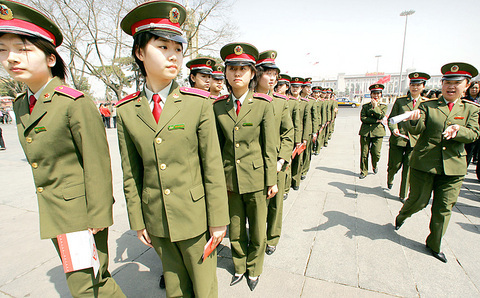China warned the public against staging fresh protests when Japanese Foreign Minister Nobutaka Machimura visits this weekend in an attempt to head off a repeat of last week's violent anti-Japanese demonstrations.
Thousands took part in protests in at least four Chinese cities last Saturday and Sunday, and Internet chatrooms, e-mails and mobile phone messages have been urging people to join a new round of protests in cities across China this weekend.
Foreign missions, wary of possible violence after demonstrators threw rocks and eggs at Japanese diplomatic missions and attacked Japanese businesses last week cautioned their citizens about new protests.

PHOTO: AFP
The demonstrations, triggered by what many see as Japan's failure to own up to World War II atrocities, come at a time that Japan is seeking a permanent seat on the UN Security Council, a move that China firmly opposes.
While last weekend's protests appeared to have had tacit state approval, the government appealed to demonstrators to avoid "extreme activities" and yesterday Beijing police warned against "unapproved or harmful" activities.
"Any assemblies, protests and demonstrations should be approved by the public security organ," the China News Service quoted a Beijing police spokesman as saying.
Unapproved and harmful activities were "illegal" and would be punished, it said.
For its part, Japan pledged not to let a series of disputes with China hinder their broader relationship.
"We must deepen mutual understanding and trust through dialogue and not allow individual issues to become an obstacle to the development of the overall Japan-China relationship," the Japanese Foreign Ministry said in an annual diplomatic report.
Machimura flies to Beijing tomorrow to meet Chinese Foreign Minister Li Zhaoxing (
Tokyo, through the Japanese chamber of commerce in China, warned Japanese firms to be on guard against possible protests. Japanese diplomatic missions in China have also cautioned Japanese in China about the protests, Chief Cabinet Secretary Hiroyuki Hosoda said.
"It seems the Chinese side is making various efforts. I would like to monitor the situation," Hosoda told reporters.
The Foreign Ministry in Tokyo, meanwhile, issued an annual report that accused China of threatening Japanese security in a series of incidents including illegal prospecting for oil in Japan's exclusive economic zone and an incursion into Japan's territorial waters.
The report cited China's undersea resource explorations in disputed waters in the East China Sea and an incursion by a Chinese nuclear submarine in those waters last year, calling them "serious problems that threatened Japan's national security, sovereignty and other rights."
However, despite such problems, it is important to build trust and understanding through dialogue, the report said.
"Stability in Japan-China relations is crucial for peace and stability in the Asia-Pacific region," the report said. "And we agreed on the need for dialogue despite difference in opinions in specific areas."

Conflict with Taiwan could leave China with “massive economic disruption, catastrophic military losses, significant social unrest, and devastating sanctions,” a US think tank said in a report released on Monday. The German Marshall Fund released a report titled If China Attacks Taiwan: The Consequences for China of “Minor Conflict” and “Major War” Scenarios. The report details the “massive” economic, military, social and international costs to China in the event of a minor conflict or major war with Taiwan, estimating that the Chinese People’s Liberation Army (PLA) could sustain losses of more than half of its active-duty ground forces, including 100,000 troops. Understanding Chinese

The Ministry of Foreign Affairs (MOFA) yesterday said it is closely monitoring developments in Venezuela, and would continue to cooperate with democratic allies and work together for regional and global security, stability, and prosperity. The remarks came after the US on Saturday launched a series of airstrikes in Venezuela and kidnapped Venezuelan President Nicolas Maduro, who was later flown to New York along with his wife. The pair face US charges related to drug trafficking and alleged cooperation with gangs designated as terrorist organizations. Maduro has denied the allegations. The ministry said that it is closely monitoring the political and economic situation

UNRELENTING: China attempted cyberattacks on Taiwan’s critical infrastructure 2.63 million times per day last year, up from 1.23 million in 2023, the NSB said China’s cyberarmy has long engaged in cyberattacks against Taiwan’s critical infrastructure, employing diverse and evolving tactics, the National Security Bureau (NSB) said yesterday, adding that cyberattacks on critical energy infrastructure last year increased 10-fold compared with the previous year. The NSB yesterday released a report titled Analysis on China’s Cyber Threats to Taiwan’s Critical Infrastructure in 2025, outlining the number of cyberattacks, major tactics and hacker groups. Taiwan’s national intelligence community identified a large number of cybersecurity incidents last year, the bureau said in a statement. China’s cyberarmy last year launched an average of 2.63 million intrusion attempts per day targeting Taiwan’s critical

‘SLICING METHOD’: In the event of a blockade, the China Coast Guard would intercept Taiwanese ships while its navy would seek to deter foreign intervention China’s military drills around Taiwan this week signaled potential strategies to cut the nation off from energy supplies and foreign military assistance, a US think tank report said. The Chinese People’s Liberation Army (PLA) conducted what it called “Justice Mission 2025” exercises from Monday to Tuesday in five maritime zones and airspace around Taiwan, calling them a warning to “Taiwanese independence” forces. In a report released on Wednesday, the Institute for the Study of War said the exercises effectively simulated blocking shipping routes to major port cities, including Kaohsiung, Keelung and Hualien. Taiwan would be highly vulnerable under such a blockade, because it